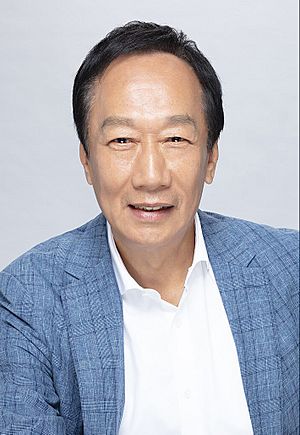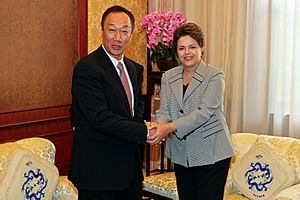Terry Gou facts for kids
Quick facts for kids
Terry Gou
|
|
|---|---|
| 郭台銘 | |

Gou in 2019
|
|
| Born | 18 October 1950 Banqiao, Taipei County, Taiwan
|
| Education | Taipei University of Marine Technology (BS) |
| Years active | 1974–present |
| Known for | Founder of Foxconn |
| Political party | Kuomintang (1970–2000; 2019) Independent (2000–2019; 2019–) |
| Spouse(s) |
Serena Lin
(m. 1974; died 2005)Delia Tseng
(m. 2008) |
| Children | 5 |
| Relatives | Sophie Chang (cousin) |
Terry Gou (Chinese: 郭台銘; pinyin: Guō Táimíng; Pe̍h-ōe-jī: Koeh Tâi-bêng; born 18 October 1950) is a Taiwanese businessman and politician. He is famous for starting and leading Foxconn. Foxconn is the world's largest company that makes electronics for other brands.
Terry Gou started Foxconn in 1974. It grew into a huge international business. Foxconn became the biggest private employer and exporter in Taiwan. It has over 1.2 million workers. In 2024, Terry Gou's wealth was about $10.4 billion.
People started wondering if Gou would run for president in 2016. In 2019, he left Foxconn to join the Kuomintang (KMT) political party. He said a sea goddess, Mazu, told him in a dream to run for president. He did not win the election that year. He later ran as an independent candidate in 2024 but stopped his campaign in November 2023.
Terry Gou has often been seen as friendly to business interests in mainland China. He was even credited with helping to ease strict rules during the COVID-19 pandemic in China. He believes Taiwan should not seek independence. He also wants to reduce tensions between China and the United States.
Contents
Early Life and Education
Terry Gou was born in Banqiao, which is now part of New Taipei City in Taiwan. His parents came to Taiwan in 1949 from mainland China. His father was a policeman.
Terry was the second child in his family. He went to school from elementary to college. After finishing school, he worked in a rubber factory and a medicine plant. He worked there until he was 24 years old. Terry has an older sister and two younger brothers. His brothers, Gou Tai-chiang and Tony Gou, also became successful businesspeople.
Terry Gou also served in the military. He joined the Republic of China Air Force. He was an officer who worked with anti-aircraft guns. He finished his military service in 1973.
Starting Foxconn


Terry Gou started Foxconn in Taiwan in 1974. The company was first called Hon Hai Precision Industry. He began with $7,500 and ten older employees. They started by making plastic parts for television sets. Their first workshop was a rented shed in Tucheng, a suburb of Taipei.
A big moment for the company came in 1980. They received an order from Atari to make joysticks for their game consoles. This helped the company grow.
In the 1980s, Gou traveled across the United States for 11 months. He was looking for new customers. He was a very determined salesman. He often visited companies without an appointment. Sometimes, security was called, but he still managed to get orders.
In 1988, Gou opened his first factory in Shenzhen, China. This factory is still his largest today. He made the production process very efficient. The factory site grew into a huge campus. It had housing, dining, medical care, and even places for workers to be buried. They even raised chickens to feed the cafeteria!
In 1996, Hon Hai started making computer cases for Compaq. This was a major step. It led to making parts for other big companies like HP, IBM, and Apple. In just a few years, Foxconn became a giant in consumer electronics.
Other Business Ventures
In 2019, Terry Gou suggested that Apple should move its manufacturing out of mainland China. He made these comments after confirming he would step down as Foxconn chairman.
Gou is also a main owner of HMD Global. This company was started in 2016 to sell Nokia brand phones. HMD buys its research, manufacturing, and distribution from FIH Ltd. This company is part of the Hon Hai group.
In April 2021, Gou became the biggest shareholder in a biotech company called Eirgenix. In December 2022, it was reported that a letter from Gou helped convince the Chinese government to ease its strict COVID-19 rules.
Political Journey
Terry Gou first joined the Kuomintang (KMT) political party in 1970. However, his membership ended after 2000. In the 2012 presidential election in Taiwan, Gou supported Ma Ying-jeou. He said Ma was an "experienced, outstanding helmsman."
Political Beliefs
Terry Gou does not support the Taiwan independence movement. He believes that the Democratic Progressive Party (DPP) "hates and opposes China." He supports the 1992 Consensus. This is an agreement that there is "one China," but with different interpretations. He has criticized the DPP for how they talk about this agreement.
Running for President
From 2016, many people thought Terry Gou might run for president in 2020. He rejoined the Kuomintang in April 2019. On April 17, 2019, Gou announced he would run in the KMT primary election for president.
Gou said that the sea goddess Mazu told him in a dream to run for president. He came in second place in the KMT primary. He received 27.7% of the votes. On September 12, 2019, Gou announced he was leaving the Kuomintang. Four days later, he said he would not run as an independent candidate in the 2020 election.
In April 2023, Gou announced he would run for president again in the 2024 Taiwanese election. He officially declared his independent presidential bid on August 28. On September 2, Foxconn announced that Gou had left its board of directors for personal reasons.
On September 14, 2023, Gou announced that actress and writer Lai Pei-hsia would be his running mate. Gou officially qualified to be on the presidential ballot on November 14, 2023. However, on November 24, 2023, he announced he was dropping out of the race.
Personal Life
Terry Gou's first wife was Serena Lin (1950–2005). They had a son and a daughter. Their son works in film and real estate. Their daughter worked in finance. In 2000, Gou started an educational charity with Serena. He planned to give away one-third of his wealth to charity. After Serena passed away, their daughter took over the charity.
In 2002, he bought a castle called Roztěž in the Czech Republic. It cost him $30 million.
Serena Lin passed away in 2005 from breast cancer. Gou's younger brother, Tony Gou, died in 2007 from leukemia.
Gou married his second wife, choreographer Delia Tseng (born 1974), on July 26, 2008. They have three children together. Terry and Delia have decided to give away 90% of Gou's wealth to charity.
Wealth
In 2016, Terry Gou's wealth was about US$5.6 billion. By August 2017, his wealth was listed at US$10.6 billion. In 2022, Gou had a net worth of $6.8 billion. This made him the sixth wealthiest person in Taiwan at that time.
See also
 In Spanish: Terry Gou Tai Ming para niños
In Spanish: Terry Gou Tai Ming para niños
 | Delilah Pierce |
 | Gordon Parks |
 | Augusta Savage |
 | Charles Ethan Porter |

